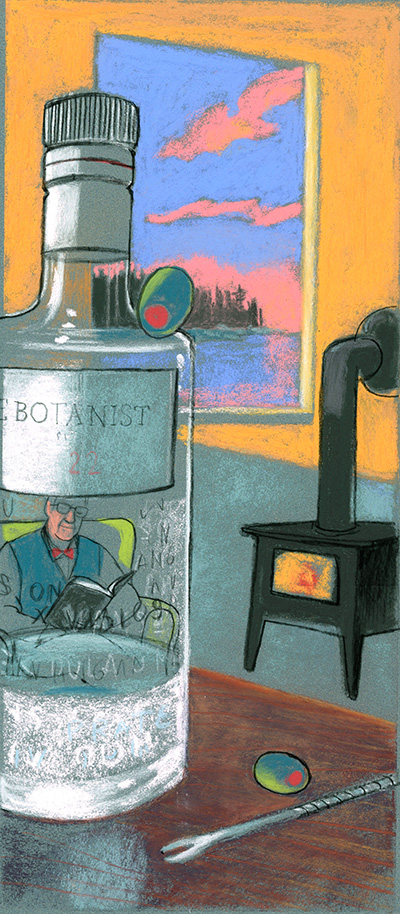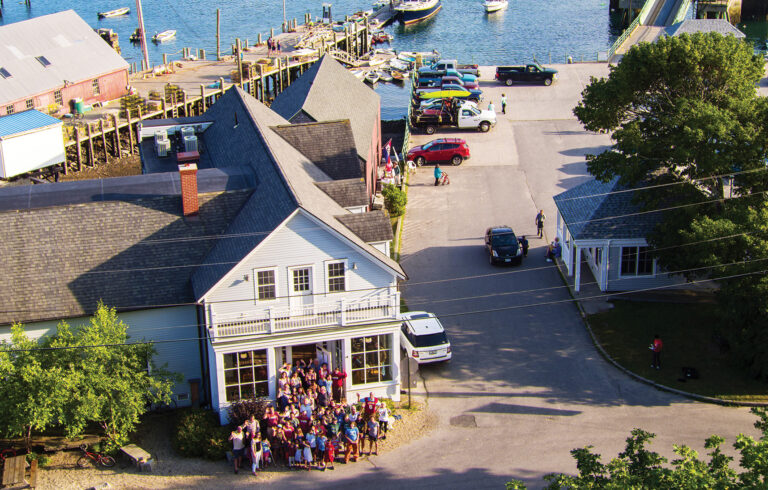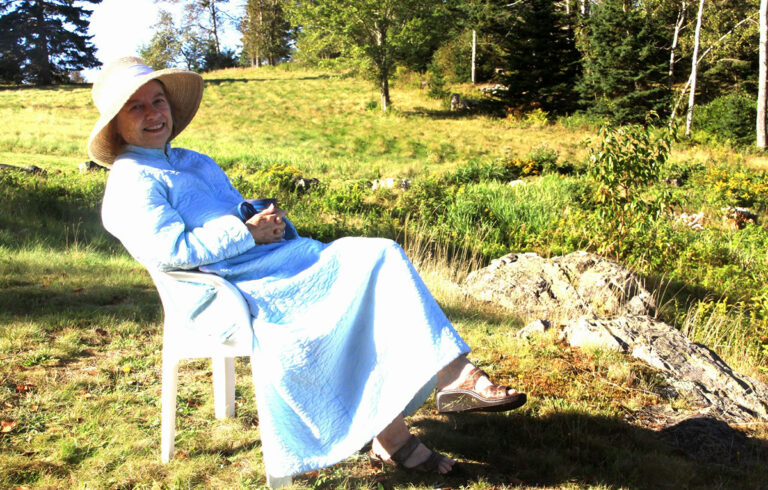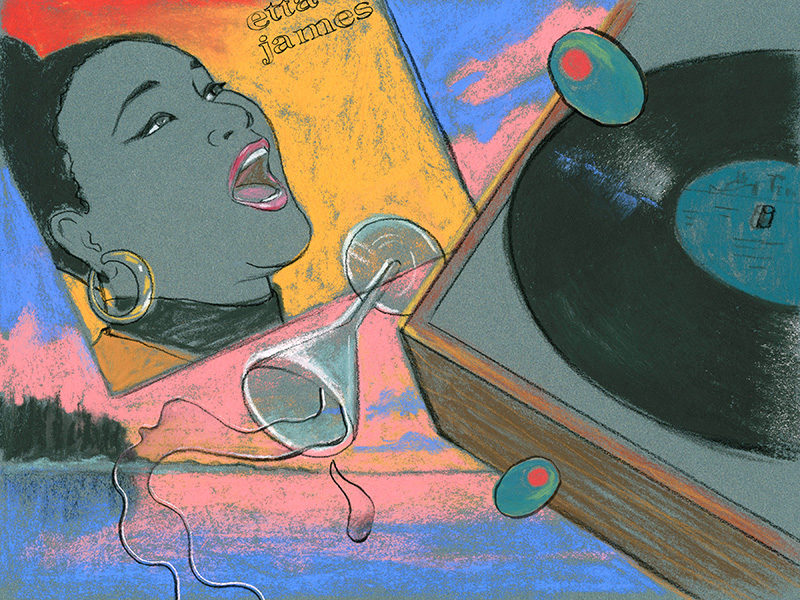
Chapter I
On a chilly evening last year, Elaine and I were invited next door to the Chambers’ to enjoy their company and that of a dozen or so others of our broadly interesting neighbors and island visitors, all gathered around an outdoor woodfire. After a while our host, David, offered me a martini, a “Killer Botanist Gin Martini,” to be precise.
I’ve suffered the occasional martini in the past but given a choice I’d customarily prefer a Scotch and soda or perhaps an Old Fashioned. I’d intended to say, “Yes, please, David,” mostly because it seemed the polite thing to do but, before I got a chance to speak, a striking woman seated nearby on my right—a friend of the Chambers whom I’d just met—reached out and touched my arm. Nodding toward David, standing expectantly before us, she said with riveting sincerity, “Don’t pass this up.”
I’d had no intention of passing it up, but her fully engaged and profoundly benevolent expression hamstrung my ability to say anything at all. Her kindly face spoke to me on a deeply personal level, spoke of compassion, of caring—caring for me and of my limited possibilities—and of there simply being so much more to everything than had ever met my limited vision and that this situation, certainly her sudden and beguiling acquaintance but also David’s offer of a martini, would reveal a world of possibilities in the few years remaining to me.
Although I did wonder what botanical element he intended to introduce to the drink or whether he was a novice botanist—I knew him to be a professor of theater—and, if he was, what difference did it make, I was ready, ready to say, “Yes, please,” so he would be off to create this alluring concoction, but I was unable to speak, staring back at this compelling creature. She squeezed my arm hard and then reached over with her other hand and squeezed with it as well. I nearly whimpered but am not sure why.
“Say, yes,” she said with stunning sincerity, “Just say yes.”
“Yes,” I said without even adding please.
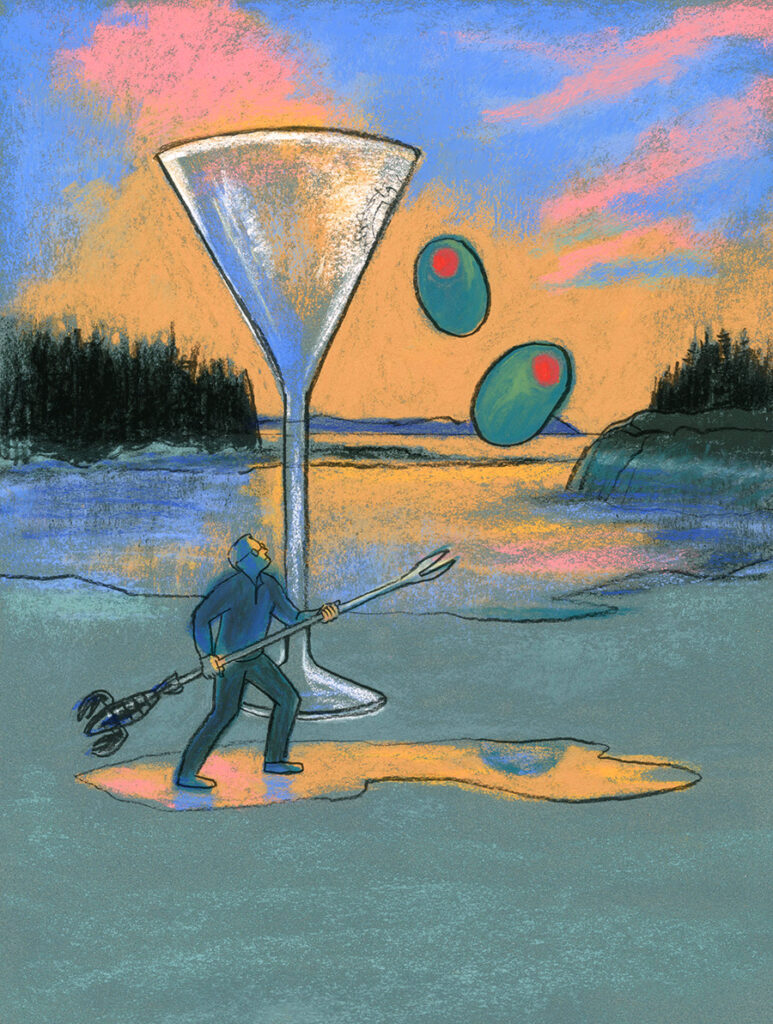
Chapter II
Seeming to feel her mission accomplished or that she’d done all she could, and the rest would be up to me and to the martini, she turned her attention—and David turned his to creation—to a fellow seated on her right, and while she didn’t seem to sense in him the same cultural vacancy she’d clearly found in me, she seemed relieved of some responsibility and engaged fully but less passionately with him on the subject of whether a modest seawall might save Vinalhaven’s Carver’s Harbor from rising sea levels.
I was momentarily bereft by her sudden abandonment but then utterly consumed by the anticipated enormity, imparted so completely to me, on me, throughout me by my efficacious but too brief liaison. I simply sat, friends and new acquaintances near at hand but I alone and elsewhere, waiting for the forthcoming enlightenment.
After half an hour or so, too long in any event, David came down from the porch, from creation so to speak, to present one after another of we assembled with the anticipated amalgamation, each a some-what amber—infused per-haps by the fading afternoon light—mélange, each nestled perfectly in beautiful and perfectly appropriate stemware, and each caressing two olives so lovingly that the notion they might be consumed within minutes was, in fact, surely not among the duos concerns.
As I watched the evolving and decorous disbursal, I regained my senses, and it became clear and then even clearer that the other guests, each among David’s long and faithful disciples, had been informed of my nescience and so each patiently fore-went tasting their martinis until, finally—and as it intentionally turned out, lastly, I would cradle my own. David stepped down from the porch a last time and walked purposefully and, entirely in character, in my direction.
Although full to the rim, his practiced hand—a thumb and two fingers to be precise—held a crystal creation of compelling structural elegance. As he extended the dazzling vessel tome, he slowly rotated it so that when within my reach its lofty engravement—Yale lex et veri-tas—swept into view. I held it reverently, carefully, and mindful of the moment and, emerging from my spell, I looked around at my fellow enthusiasts, each smiling and encouraging and raising their glasses fraternally in my direction.
I felt quite suddenly—and perhaps even finally—alive, and, now one of them, took my virgin sip of the same coveted refreshment that had been theirs, clearly, since whenever they first enjoyed one of David’s martinis.
Chapter III
An awakening is precisely that. The term can’t be used to describe any pedestrian discovery, rather, is reserved for such staggering illumination as was experienced by mankind beginning in the First, Second, Third and Fourth Great Awakenings. This epiphanal experience, this drink, might have been the Fifth.
I sipped my martini and felt a kinship with those around me, they sipping as well, a refined sipping, unlike anything I’d ever seen, certainly not a level of refined consumption I’d ever indulged. We were now kin. The conversation turned from the mundane to the literary and I was asked with unmistakable sincerity about some of my own writing, my columns in The Working Waterfront—little pearls someone called them.
In about half an hour, the first of my brethren finished his drink and David took subtle note from his station on the deck. Three others followed and then, mindful of procedure and so again lastly, I ate my, by then delicious, olives and nodded in dumbfounded acquiescence when David asked if we, if I, would like another.
Chapter IV
I’m sure I floated ethereally homeward later that evening and I know I remained blissfully mellow until bedtime.
Individuals all around the world and throughout time are possessed of a wondrous range of gifts. Bertrand Russell, mathematics. Galileo, astronomy. Turing, computer science. Suffice to say, there are countless numbers of us.
My own proficiency is in procuring ferry reservations (line numbers) where others consistently fail. And so it was, on Aug. 23, a few days after my blissful afternoon, David called to ask if I could get him a line number and, although I had happily done this favor for him and for his wife Christine on several occasions, he felt compelled, this time, to promise mea Killer Botanist Gin Martini in exchange.
 This was unnecessary and, frankly, needlessly weighted the whole business. If, as has been known to happen—although rarely—I was unsuccessful in securing the 10:30 he asked for, I could only think of the awkward circumstance that would result. He surely wouldn’t feel like saying, “Sorry, you failed me and so no martini,” and, if offering one for my having tried, as he might do, I tried to say, “No, I don’t deserve it”—well, you understand—awkward!
This was unnecessary and, frankly, needlessly weighted the whole business. If, as has been known to happen—although rarely—I was unsuccessful in securing the 10:30 he asked for, I could only think of the awkward circumstance that would result. He surely wouldn’t feel like saying, “Sorry, you failed me and so no martini,” and, if offering one for my having tried, as he might do, I tried to say, “No, I don’t deserve it”—well, you understand—awkward!
As it happens, though, I was successful and he graciously delivered a jar containing, not one, he told me, but two, prepared Killer Botanist Gin Martinis. They begged only to be nestled in a suitable glass, one at a time, perhaps tonight and then perhaps again tomorrow, in a quiet and reflective environment, perhaps accompanied by some suitable music.
I brought up At Last by Etta James, turned the volume down a little, asked Elaine to hold all my calls, and went to the China cabinet for a suitable glass.
Chapter V
An exploration of the cabinet revealed no martini glass. I delayed a day or two looking elsewhere for the glass I was sure existed somewhere among my accumulation of things, while the two killer creations waited patiently on the kitchen counter for consummation but, I was unsuccessful. I honestly couldn’t bring myself to try and enjoy David’s profound and sanctified concoction in one of my numerous Old Fashioned or wine glasses—it seemed tantamount to denying justice—and so, I finally ventured over to his place to ask if I could borrow one of the lovely stemware assortment in which he’d presented his creations a few days earlier.
David was at work in Connecticut but Christine was home, and, fully understanding my predicament and my decision to seek out worthy service for the drinks, immediately presented me with the lovely and delicate, perhaps the only, Yale lex et veritas while dismissing my concerns about entrusting me with what I took to be a sentimental and perhaps valuable piece. Thanking her profusely and cradling the fragile glass carefully, I returned home. Elaine was in the kitchen preparing dinner and I gleefully and too excitedly announced that I was to finally enjoy the first of David’s two Killer Botanist Gin Martinis.
I cued up Etta again and began preparation, which, since they were already assembled, only required that my drink be properly chilled and provided with a companion olive. Done, I retired to my study, put the drink down on my desk, turned to tap “play,” and knocked the glass off the desk onto the floor.
Chapter VI
I fell to my knees and, my tears blending with the Killer Botanist Martini now spreading out across my office floor, I gently picked up the glass. Incredibly, it was not broken; rather it was cracked. Just then Etta sang, “My heart was wrapped up in clover the night I looked at you” and I thought how completely and certainly otherwise my own broken heart was wrapped in sorrow and heartache as I, this night, looked at what I’d done with David’s loving creation.
Elaine hurried in to sympathize and console but I was beyond recovery and by then considering sponging up the spillage with a rag and perhaps ringing its contents out into the glass and consuming it and whatever grit I swept up in the process, as punishment for having been so careless.
Of course, I could return to the kitchen and try to do better with the remaining Killer Martini, but the possibility loomed large that the marginally additional stress would shatter the damaged and yielding glass. If that were to happen, I’d have no recourse but to return to the Chambers and confess my carelessness, having not enjoyed even one of the two so graciously prepared Killer Martinis.
No, far better that I simply return the glass without acknowledging the damage in hopes they wouldn’t notice until one day down the road they discovered the crack and, forget-ting they’d once lent it to me, would reasonably assume that the glass had simply yielded to David’s own excesses over time.
I was torn and compromised but still barely honorable enough to resist pouring the remaining Killer Martini into an unsuitable glass. I sat down at my desk with a Scotch and googled “Yale Lux et Veritas Martini Glass.”
Chapter VII
In no time E-Bay revealed the availability of two identical glasses for $70 and, upon verifying their authenticity, I bought them and eagerly awaited their arrival while afraid each day that Christine would call and ask if I was done with the martini glass because David might call at any minute and ask, “Is my glass safe and OK?” Or worse, he might arrive unexpectedly and invite her to join him in each enjoying a Killer Martini only to discover they only had one of two glasses, that I had the other and, upon reasonably demanding its return, discover I had broken it.
However, several days passed; there was no feared inquiry, and the two newly acquired glasses arrived, carefully packaged, preserved and unbroken. My relief was palpable.
I gently removed the stemware from its packaging, set one aside to be returned to the Chambers and, once properly chilled, poured the second martini from days earlier into the other. I visited the creation with two olives—each fraught with excitement—deposited the drink on my desk, cued up Etta again and, luxuriating in anticipation, walked back across the yard to the Chambers to nonchalantly return the second, albeit counterfeit, glass. Christine was home alone, thanked me for the glass and, in a turn of events that left me feeling everything was nearly, if not entirely, right with the world, gifted me with their nearly empty bottle of Botanist Gin.
I returned home, stashed the concoction in a safe place and settled in my office with Etta to enjoy the second Killer Martini. It was all I’d expected and might have enjoyed with the first had I not been so reckless.
Chapter VIII
Things were looking up. I was mindful of David’s admonition that there is nothing worse than a warm martini, a caution first delivered during the social event described earlier—but then over and over in ensuing communication, to such an extent that the emerging drink might have been labeled the “redundant martini.”
I only lingered with Christine for a few moments, and then hurried back across the yard, full of excitement and anticipation, to enjoy the perfectly chilled creation waiting for me there at home. Much more warily, I retreated to my office and, just as Etta gave voice to our communal and emotive gratitude, I at last took my first sip. The ensuing silence must have alarmed Elaine a little as she came in to see if I was OK and could tell, right away, that I’d “found a dream that I could speak to, a dream I’d call my own, a thrill to press my lips to,” a drink I’d never known.
The next day, now in possession of his residual Botanist, I emailed Dave, asking for his perfect Killer Martini recipe. In response, he wondered if I was working with Botanist or some lesser gin, and suggested—sounding suspicious, clearly concerned that Christine might have rashly given his remaining cherished ingredient to a novice—that I pour three, four, or five ounces of it, a drop of orange bitters, and a tiny drop of vermouth into a stainless-steel shaker filled with ice, stir slowly 60 times, pour into a chilled martini glass that’s been kept in the freezer for a full day, add an olive or two on a tooth-pick and enjoy. I poured the Botanist into a measuring cup to see how much I had—finding ten ounces exactly. I could thus have two at the maximum dosage or three or four lesser concoctions. I tucked my veritas glass carefully into the lower freezer drawer between two bags of newly harvested rhubarb and sat down with a Scotch to consider my options.
 Chapter IX
Chapter IX
I went back to review the email and noticed he suggested I determine the quantity of gin with my own tolerance in mind. I think of myself as endlessly tolerant and so the next night, my glass having chilled somewhat, I poured five ounces of Botanist into a measuring cup and set about finding my other ingredients. As I am so often reminded, I should plan ahead. I had aromatic bitters—I’d been an Old-Fashioned fan after all—but no orange bitters. I had no vermouth; rather the bottle I thought tucked away in a corner of the liquor cabinet was dry sherry. I had no stainless-steel shaker.
My patience had run out though; it had been a difficult day, stores had closed, and I had sunk to such extraordinary depths of anticipation that I was willing to sacrifice the consecrated elements of deliverance in favor of simply having a drink, instead of enjoying a legitimate Killer Botanist Gin Martini. I put the five precious ounces into a large plastic two-cup measuring device filled with crushed ice, added a drop of aromatic bitters and a drop of white wine—having looked it up and found it was a less than ideal but other-wise suitable vermouth substitute—stirred 60 times with a stainless-steel lobster pick, poured it all into my very cold and thus perfect Lux et Veritas, impaled two lovely and eager green olives and put them into the glass.
This time I settled in on the couch with my feet up on the coffee table and read the latest issue of The Working Waterfront. Everything was lovely, nearly perfect—nearly. It lacked authenticity. The next day I checked my emails and here, only three days after having felt compelled to remind me that a warm martini was a bad martini, he again issued the same remonstrance.
I secured a 12-ounce insulated (stainless-steel interior) coffee cup from Jeannie Island Closet and some orange bitters from Carver’s Harbor market. This time I showered before-hand, shaved, dressed appropriately, including my red bow tie and the classic vest Elaine made for me early in our relationship, and settled in again but this time by the woodstove—it was just chilly enough for a fire—with our book group’s latest selection: Ethan Frome, and with a bona fide Killer Botanist Gin Martini and put my feet up on an ottoman, where they belonged.
At Last.
The End
Phil Crossman lives on Vinalhaven where he has served on the select board. He owns the Tidewater Motel. His books include Away Happens and As the Crow Flies. Jamie Hogan is an illustrator who lives on Peaks Island. Her work illustrates the young adult book Leap Frog, by Rae Chalmers.

